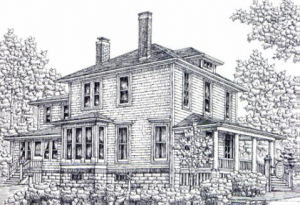Lately, you’ve heard much about our efforts to digitize the files we keep on each home in the La Grange area. A much less talked about endeavor, though, is the one to photograph and transfer to computer file the original Book of Ordinances of La Grange which dates from 1879-1885, and is entirely hand-written. As a result of this undertaking, it is now protected from the inevitable damages caused by handling, or worse. It contains 102 ordinances, many essential to the creation and orderly function of a village and its government. By tracing one topic through the ordinances, such as provisions for the sale of alcohol, insights emerge into the moral tone of a community, and its constantly evolving nature.
Ordinance 4, 1879: no sale of alcohol in quantities less than four gallons is permitted without a license in the village, subject to a fine of $10-$100 per violation. Chemical, medicinal and sacramental uses are exempted.
Ordinance 4, 1885: its revision now allows sales of at least one gallon. The fines are also increased.
Ordinance 65, 1885: permits the licensing of beer wages in the village for sales of not less than one dozen pint bottles to private residences only. A license for a beer wagon requires a $500 bond and an annual fee of $100.
Ordinance 96, 1885: no sale of alcoholic beverages “in any quantity whatever” is allowed without a license. Fines increase again; and, the penalty for an infraction by a business is that it will be shut down until a $1000 bond is paid against any future violations.
Some ordinances, while surprising, are proof that justice was harsh in the village’s earliest days. Remember before reading the next ordinance, that the rabies vaccine would not be invented by Louis Pasteur until 1885. The following, from 1881, after an outbreak of the disease, reflects a need for swift action.
Ordinance 13, 1881: the owner of any free-running unmuzzled dog is fined $5. In addition, for 30 days, every citizen is authorized to kill any unmuzzled dog at large on their premises; and, the Village Marshall is similarly authorized to kill any unmuzzled dog found at large in the village.
The ordinances range from regulations defining misdemeanors and nuisances to details about the various penalties for violations. There are also many less exciting ordinances, according to Ed Thoele, longtime member of the historical society. “Eleven of them cover street improvements, which basically entail macadamizing several blocks of a street, specifying even the size of gravel to be used at each depth. Less exciting still are the sidewalk ordinances, that provide guidelines dictating the size of planks to use, and the number of rails and nails to include, etc.” Thoele also said, “it’s a pity these are so boring to read, because some of the sidewalk ordinances contain the finest examples of beautiful Victorian-era Spencerian handwriting available in our records.”
Originally published in the Summer, 2013 edition of the newsletter of the La Grange Area Historical Society.

